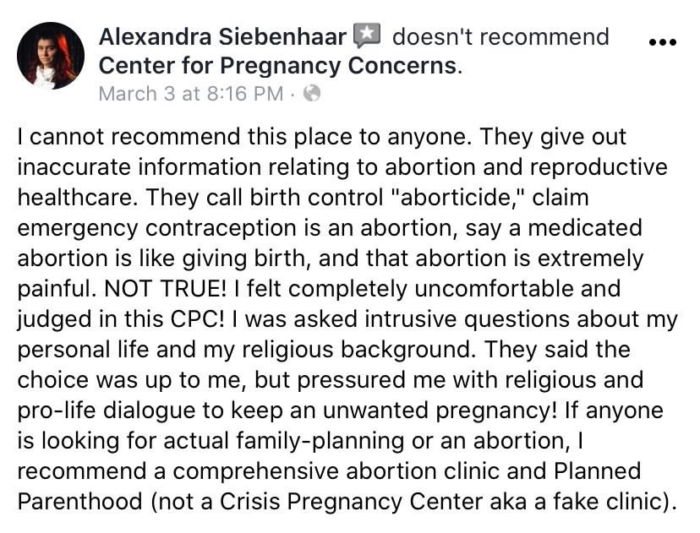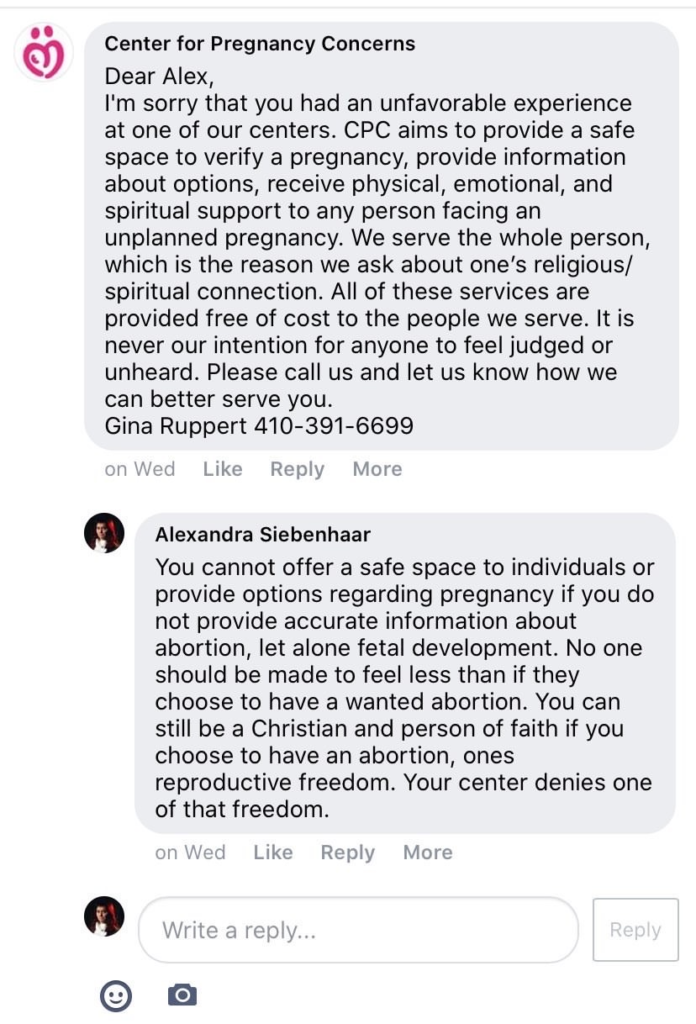I walked into a fake clinic in Arbutus, Maryland on a late Friday afternoon with a vile of urine (that was not mine) in my purse that would indicate I was pregnant. There were children, children’s toys, and a rack of baby clothing of various sizes in the waiting room.

This fake clinic is a part of a chain, the Center for Pregnancy Concerns, with other locations in Dundalk, Essex, and Baltimore City. The woman at the front desk greeted me with a smile and asked if I had an appointment. I had made my appointment online earlier that week for one o’clock, but later received a voicemail telling me they had to change it because someone took my time slot. We shared small talk and verified the reason for my appointment–to take a pregnancy test. I was asked to make a copy of my ID and was given a sheet to fill out where I checked the services I wanted to investigate: abortion counseling and post-abortion counseling. I read below, “We do not recommend abortion services or birth control because it is aborticide.”
I had found this fake clinic on one of my Thursday evening rides to the Esperanza Center in Baltimore City with other University of Maryland: Baltimore County (UMBC) students. We teach immigrants English as service-learning. Just down the street from my campus and across from OCA Mocha, a local coffee shop that provides community for UMBC students, sits the CPC. The building’s exterior isn’t very welcoming, with vacant windows and a sign reading: “Free Services (Pregnancy Tests, Sonograms, and Material Assistance),” marketing itself to patients as a family-planning clinic. I am currently working on an educational campaign to disseminate information to UMBC students about fake clinics, comprehensive abortion clinics, the types of clinics UMBC’s Health Center refers students to, and making emergency contraception accessible 24/7 on campus. I wonder how many UMBC students have walked through those doors seeking abortion care who were given false information instead.
Because fake clinics target vulnerable populations, I also wonder about how many undocumented immigrants have walked through those doors out of fear of not being able to provide for their child due to their economic or citizenship status, the current administration’s racism, and facing an unwanted pregnancy. According to the Migration Policy Institute’s “Frequently Requested Statistics on Immigrants and Immigration in the United States,” 67% of undocumented immigrants are from Mexico and Central America. Hispanic women make up 25% of all abortion patients in the U.S., and Latina women in the U.S. experience greater stigma in intimate relationships and are more likely to hide their abortion than other ethnic groups, as found in “Relationship Between Perceived Stigma and Depressive Symptomatology in Women Who Legally Interrupt Pregnancy in Mexico City.” This study also found that most women interviewed were worried about how their relationships would change after getting an abortion. Fake clinics add to this abortion stigma; this fake clinic offers forms in Spanish, likely using the language barrier to its advantage to manipulate its Hispanic and/or Latinx patients.
I was taken back into a room with posters that screamed abstinence and “pro-life.” My “counselor” had her child in the room, nonchalantly playing with figures of fully-grown babies, as she told me about the delight of parenthood. People should get to decide to be parents if they want to be. People should be allowed bodily autonomy, the right to choose an abortion, and the right to accurate information about medical procedures.

My “counselor” told me everything I told her was confidential (except the door wasn’t fully closed and her child was playing in the room) but that she would have to report anything she perceived to be physical abuse or sexual assault. She asked when my last period was and when I was uncertain, she asked when I last had sex. She asked about my marital status. She asked about my relationship with the father of my baby. She told me, with distaste, to get a STD check at my OB/GYN. She asked about my religion, and I responded “Methodist,” wanting to emphasize my religion because she made it out to be that I wasn’t Christian. You can identify as a person of faith and still have an abortion: I am Christian and if I were actually facing an unwanted pregnancy, I would have an abortion.
After the intrusive questions about my personal life, I was given instructions for taking the pregnancy test. She said I could either take it in the room we were in or the bathroom (I chose the bathroom), and she stood outside the door because it wouldn’t lock. I dumped the vile of urine from my purse into the cup and dripped three drops on the pregnancy test. When I finally opened the door, I saw her glance at the test as we walked back into the “counseling” room. She asked me with a smirk, “Do you know what this means?” I replied no, to which she said, “One line means pregnant and two lines means really pregnant.” The hostile environment they created made it hard for me to say the word “abortion,” which is exactly what they want. I can’t imagine how a truly pregnant patient might feel interacting with this “clinic.”
She got out a binder to show me images of fetal development and as she flipped through the pictures, I saw her tearing up to this mis-informative sketch of life. I was given a pamphlet on abortion (the lies in the pamphlet differed from the lies she told me), one titled “Ten Questions Expectant Mothers Ask About Adoption,” and one on Bethany Christian Services. I felt the judgment in her voice when she said there are people waiting to become parents, and she continued to push adoption after I told her I didn’t want to continue my pregnancy. I asked for pamphlets about birth control, but they didn’t have any, except one about condoms, which I was not given because she thought it didn’t apply to me.
I was again pressed with questions, but this time they were religion-heavy: What church do you go to? How many times do you go? Who do you go with? Are your parents pro-life or pro-choice? Do you have a boyfriend? Are you going to tell the father of your baby you’re pregnant? How do you think he’s going to react? Are you afraid to tell your parents? What are you going to do after leaving here today? Do you think you’re a Christian? What does it mean to be a Christian? Where do you think we go after we die? Do you think God put you here for a reason? Do you have or want a Bible?
Do you want me to pray for you?
I nod yes, out of curiosity, and she said a prayer.
This questioning probably had to do with the fake clinic’s proximity to Matt’s House Church. The United Methodist Church, which I belong to, preaches anti-abortion discourse. The Church’s principles state: “We affirm and encourage the Church to assist the ministry of crisis pregnancy centers and pregnancy resource centers that compassionately help women find feasible alternatives to abortion.” Fake clinics do not compassionately help women. By wanting women to find alternatives to abortion, fake clinics shame those who have already had an abortion or who wish to have one. No one should have to justify or get approval to have an abortion.
To the United Methodist Church ministry: how can you exhibit open hearts, open minds, open doors, all while denouncing those who choose, deservedly, to have an abortion? I urge you and those who condemn abortion to educate yourselves and stop these false claims. 1 in 4 women in the U.S. will have an abortion by the time they are 45 years old. Additionally, 62% of women who have an abortion are religiously affiliated. I am positive there are women in my church and women in other United Methodist Churches who have gotten abortions, and they deserve to sit in sermons, worship, and pray without facing stigma about accessing their basic reproductive healthcare needs.
Before I left, my “counselor” gave me her card and told me she’s a doula. I was shocked. How can she be a supportive doula if she doesn’t understand fetal development and believe that abortion is healthcare? The anti-abortion counselors may have said the choice was up to me, but no one has a choice there. Crisis pregnancy centers are a public health crisis.


1 comment